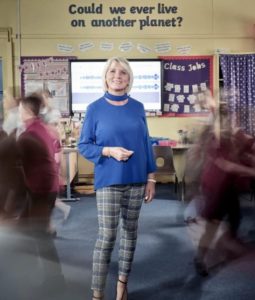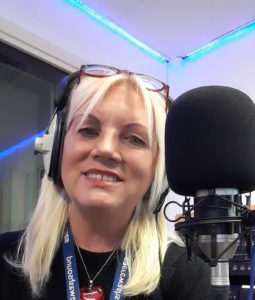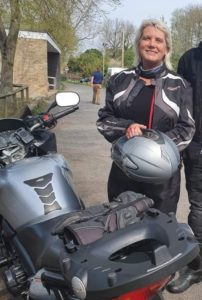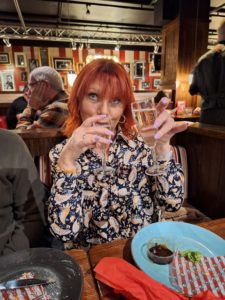Nikki’s Story: Part 4, The Final Chapter – The Bright Side of Life
The Bright Side of Life
It was 2009. I’d put the hideous transplant saga behind me and moved back to the school where my career began as a parent helper in the 90’s. I loved it and made some fantastic friends. The children made me laugh every day and I was drawn to the ones who struggled in class or wound the teachers up the most! I got the name “The Nikki Fretwell Experience” at work because I was up for anything.
However, I’d changed. Since removing myself from the transplant list, I knew I’d spend the rest of my life, however long that was, on dialysis. That was absolutely fine, but my life was precious now. I needed to get my priorities right. My marriage had been broken for a long time and although it wasn’t because of my health, being ill probably didn’t help.
They say that during times of need, you find out who your friends are and I certainly did. They appeared in droves. Jo, my class teacher, offered me a key to her house. “Just turn up. Whenever you want.” My old school friends got back in touch. My sister, Joanne, my rock through the transplant disaster, was my rock once again.
I rented a nice little semi. I couldn’t afford to buy and with kidney failure, I wouldn’t get a mortgage anyway. Friends and family donated furniture and I got a second job: teaching brass instruments and djembe – African drums, to help pay the bills.
What I really wanted was home dialysis. Living alone, it wasn’t allowed. My consultant, Dr Bebb, was really supportive though. She did her research, my landlord agreed, and in 2010 I was flying solo at home on a Braun machine.
Standing at around five feet tall, it sat on a large plastic tray, with a water softener and an RO (reverse osmosis) unit to purify the water supply. I had a comfy reclining chair and a TV. It was so much easier than travelling to and from hospital three nights a week.
I just went to work, dialysed after, and enjoyed life. I did a bit of private tuition in the evenings as money was always a concern.
In 2014, after being on the machine for twenty-odd years, I was getting tired. I needed more dialysis but, again, nobody who lived alone did nocturnal (overnight) dialysis. Dr Bebb agreed that it would be beneficial to dialyse more. I began dialysing overnight in the September. It was the best decision I ever made.
Nocturnal dialysis, if you’re interested, is the Rolls Royce of treatment. It’s much slower and removes more toxins from the blood, more gently, which is better for the heart.
On nocturnal dialysis, my blood results changed overnight, literally. I didn’t ’t need to be on a strict diet anymore. I could drink coffee and eat chocolate! I could have chips and fruit and mushrooms again. Even better, I had more free time than I’d had for twenty years!
I used this time constructively. I took more qualifications to teach and specialised in English.

Being a TA and teaching wasn’t enough. I took on another role as clerk to the school governors. I had a full social life, a full work life; and my son had finished university and worked for an airline. I was, and still am, incredibly proud of him.
I was living, and loving, my best life.
I was Wonder Woman.
At least .. I was behaving like Wonder Woman.
It was June 2018. Twenty-eight years since I started dialysis. I never really talked about it. My mantra was ‘dialysis is something I do; it doesn’t define me.’
But I was tired, both physically and mentally. All I seemed to do was work/dialyse and work again. Looking back, I think I was scared that if I stopped .. I’d never start again. I’d been ignoring the fatigue I felt constantly and kept going.
Until I woke up one day and I didn’t want to go to work. And I didn’t know why.
———-
Under duress, I agreed to see the renal psychologist ..
I didn’t really know what I was supposed to say. There was nothing wrong with me. Dialysis was fine.
“Why don’t you talk about dialysis?” she asked. I said it was boring. People wanted The Nikki Fretwell Experience, not all that morbid stuff.
She asked what I thought depression looked like. I just shrugged. Then, she showed me some breathing exercises and asked me to try them.
“Can I just do them at home?”
“Why?”
“Well .. they take too long.”
“Nikki, you won’t even give yourself the time to breathe properly.”
She said I was suffering with high functioning depression along with anxiety and extreme fatigue. Dialysis burnout. She told me to Google them, which I did.
Suddenly, the penny dropped. She was right. I couldn’t keep up the facade any longer.
I took time off work. I took antidepressants. For the first time in my life, I was vulnerable. I’d built a wall around me. I thought I was invincible. The psychologist took that wall away; and taught me about myself and why I was so fiercely independent. Why I never talked about my life on dialysis. Why I never asked for support.
———-
I returned to work in the September for another amazing year but secretly, I knew the game was up. I’d never entertained the idea of leaving before, but I didn’t want to die in a classroom in front of my pupils.
When a local radio station interviewed me about kidneys and dialysis, it opened yet another door .. they invited me back. I’ve always had a love of music and I was invited to train as a Radio Presenter. I couldn’t say no, of course, and I soon had my own show on air.

When COVID-19 struck, I had another breakdown. As someone with compromised immunity, I was vulnerable again and had to isolate for weeks. I couldn’t see anyone. I couldn’t do my weekly radio shows. I’d fought all these years to live a normal life and suddenly, my control was taken away. I’d look at the dialysis machine at night and think .. “what’s the point?”
I went back on antidepressants and Diazepam. Looking back, it’s unsurprising that I was struggling. Along with the impact of COVID, I was going through the process of leaving work and my mum was ill. The renal psychologist came to the rescue once more and helped me to sort out my head and my finances. My family and friends rallied round and eventually I got on top of things again.
My workplace had always been really supportive. However, when I tried to get my pension by retiring on ill health, Human Resources, like the general public, didn’t have a clue. A woman came into school, took one look at me and said,” You’re too young to get your pension, and you don’t really look that ill.”
My consultant, renal psychologist and a doctor from Occupational Health all submitted damning reports which left her in absolutely no doubt that I was, indeed, too ill to be working and I was granted full pension aged 49.
My psychologist said something that has stayed with me. “Nikki, your life is like the edge of a cliff. The cliff is crumbling, so buy yourself a caravan and enjoy the view before the cliff crumbles.”
It was time to hang up the Wonder Woman costume.
My outlook changed. I began to understand the value of my experiences. I spoke at renal conferences and webinars. I took part in an exhibition in London about life on dialysis. Now, I write articles for the CKDExplained website and contribute to kidney research and support other patients nearing dialysis.
My aim in life is to enjoy new things. I have a bucket list. I’ve driven a vintage steam roller.

I’ve been on a motorbike and in a helicopter.
I’ve been to Parliament to lobby MPs about earlier detection of CKD. I go to the theatre and concerts to see my favourite bands. Always looking for a new challenge; I joined a brass band on baritone horn.
And at night .. I dialyse.
———-
It’s June, 2024.
I’m currently one of the UKs longest surviving, non-transplanted dialysis patients. I have around thirty-five hours of dialysis per week, through the night.
It’s been thirty- four years. I know I’m on borrowed time and it’s quite scary. I need frequent fistulaplasties because the veins are narrowing in my fistula. I have no other access. I also suffer with other, long-term dialysis related issues. I have peripheral neuropathy, osteodystrophy and vascular calcification. I have lost my hearing because of dialysis and use hearing aids. I can’t do anything about these issues but I won’t let them stop me living my best life.
I’ve outlived everyone on my unit, including some transplanted friends. I’m seeing the renal psychologist again. I have dialysis OCD (I have panic attacks if I think I need to dialyse, even when logically, I don’t.) It’s preventing me going on holiday so I need to get it sorted as Rome is next on the list!
I’m making .. preparation .. for when the time comes. I’ve controlled my life, so I’m definitely not handing over my final farewell to anyone else!
I have a wonderful family, fabulous friends and an amazing partner. I have hobbies. I have my dog, Finn, whom I adore.
I have my son, Daniel, who still is my ‘reason for being’.
I have so much to be grateful for. I consider myself lucky. I will never lose the belief that looking on the bright side of life is the reason I’ve come this far.
If you’ve read my story, thank you. This is the first time I’ve documented my life as a renal patient. If I’d been asked to write this a few years ago, I’d have said no. I was on dialysis, yes, but I never saw myself as ill. I tried my hardest to be ‘normal’ and talking about the reality might make me face it myself. I wasn’t ready to do that until recently.
Life is hard for everyone sometimes. We all face challenges. I’ve been through divorce. Bereavement. Redundancy. Financial worries. Mental health issues. They were my challenges; being on dialysis wasn’t. That was the easy part.
This story is not a ‘poor me’ platform. I’ve never wanted anyone to feel sorry for me. I used to wish people had more understanding of what dialysis patients in general go through. But actually, I don’t think anyone can truly understand how it feels to be kept alive by a machine. Because that’s the bottom line.
The only thing standing between me and death is the five-foot-tall machine in the next room. That’s the reality.
People say things like ‘inspiring’ or ‘Warrior’. I’m none of those things.
I choose life.
Kidney disease can happen to anyone. It’s a thief. It can steal our independence, our relationships, our identity; the person we once were. It’s like a job with no pay and no holidays or time off. Every week, every year, dialysis patients need treatment. No breaks. Holidays are planned around where and when dialysis is available. It can’t be missed.
Having said all that, I want people to know, especially those facing dialysis, that life can be good even when you need a machine to give you that life. Dialysis has, so far, given me thirty-four years of life that I wouldn’t have had.
Here’s to the next thirty-four years. 
Dialysis is something I do. It doesn’t define me.
Nikki Fretwell (aka The Nikki Fretwell Experience) 2024
Last Reviewed on 26 June 2024
